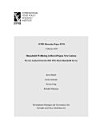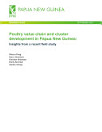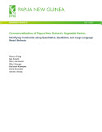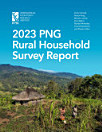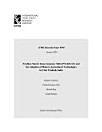The gendered effects of rainfall on early childhood nutrition: Evidence from Papua New Guinea
Leight, Jessica · Mukerjee, Rishabh · Schmidt, Emily
Sep 2025 · IFPRI Discussion Papers Book 2358 · Intl Food Policy Res Inst
Ebook
22
Pages
family_home
Eligible
info
reportRatings and reviews aren’t verified Learn More
About this ebook
Rainfall fluctuations can significantly reduce welfare for poor rural households in low- and middle-income countries dependent on rainfed agriculture for consumption, and in some contexts these adverse effects may be borne disproportionately by vulnerable household members, particularly children and girls. We present new evidence around the effects of rainfall fluctuations on child anthropometric status in Papua New Guinea, an understudied context characterized by some of the highest stunting rates in the world. We show that negative fluctuations in rainfall within a 12-month period are associated with reduced household consumption (driven by reduced consumption of own-produced food). Moreover, when these fluctuations are observed in the first year of a child’s life, they lead to a reduction in height forage and weight-for-age (though no shift in stunting), but this effect is observed only for girls: boys seem to be protected from the adverse effects of rainfall fluctuations experienced in infancy.
Rate this ebook
Tell us what you think.
Reading information
Smartphones and tablets
Install the Google Play Books app for Android and iPad/iPhone. It syncs automatically with your account and allows you to read online or offline wherever you are.
Laptops and computers
You can listen to audiobooks purchased on Google Play using your computer's web browser.
eReaders and other devices
To read on e-ink devices like Kobo eReaders, you'll need to download a file and transfer it to your device. Follow the detailed Help Center instructions to transfer the files to supported eReaders.





